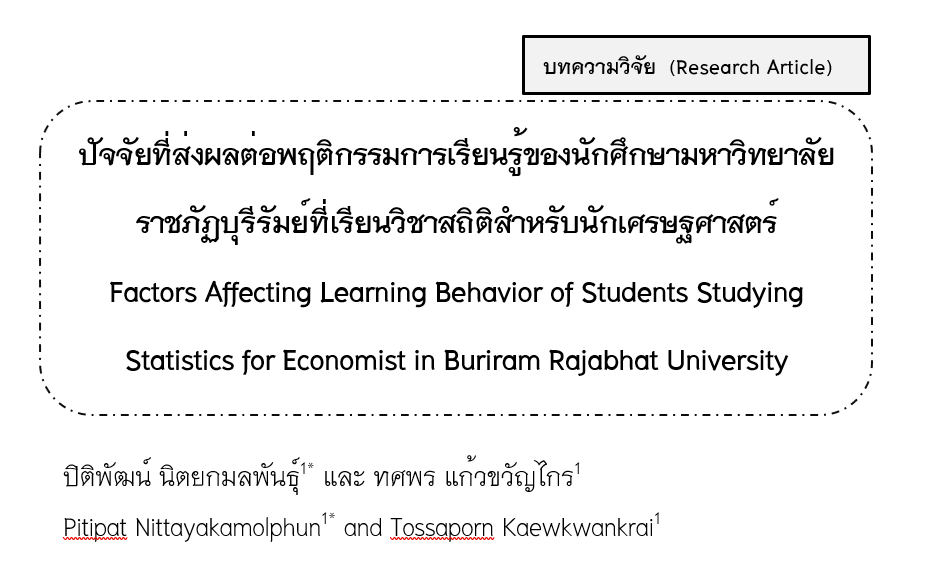Development of Higher-Order Thinking Skills through the Flipped Classroom Teaching in Philosophy of Education Course
Keywords:
Higher-Order Thinking Skills, Flipped ClassroomAbstract
This research aimed to study the effect of flipped classroom on development of higher-order thinking skills through the Flipped Classroom teaching in Philosophy of Education Course. Use basic research patterns by conducting experiments based on a single group research plan, measuring two times before and after the experiment. Target groups include 1st year students, Bachelor of Education Program Lampang Rajabhat University registered in Philosophy of Education Course In semester 2/2561, 1 group of English and Psychology courses, a total of 15 students were acquired by means of a specific selection The tools used in the research consisted of tools used in learning management, and the tools used for collecting data are Advanced Thinking Skills Test Data were analyzed using basic statistics such as frequency, percentage (%),mean (), standard deviation (S.D.) and t-test Dependent Sample. The results of the study showed that the higher-order thinking skills of students in the academic philosophy courses were significantly different at the level of .01. Shows that students who have taught by using the inverted classroom have higher thinking skills than before studying with statistical significance at the level of .01.
References
ทิศนา แขมมณี และคณะ. (2549). การนำเสนอรูปแบบการเสริมสร้างการคิดขั้นสูงของนิสิตนักศึกษาครูระดับปริญญาตรี สำหรับหลักสูตรครุศึกษา (รายงานการวิจัย). กรุงเทพฯ: คณะครุศาสตร์ จุฬาลงกรณ์มหาวิทยาลัย.
ปกรณ์ สุปินานนท์. (2558). การพัฒนาบทเรียนอิเล็กทรอนิกส์สำหรับนักศึกษาในรายวิชา FEM313 การพัฒนาหลักสูตรโดยใช้วิธีการสอนแบบห้องเรียนกลับด้าน. วารสารราชพฤกษ์, 13(3), 51-56.
ผ่องพรรณ ตรัยมงคลกูล และ สุภาพ ฉัตรภรณ์. (2555). การออกแบบการวิจัย. กรุงเทพฯ: มหาวิทยาลัย เกษตรศาสตร์.
สำนักงานคณะกรรมการการศึกษาขั้นพื้นฐาน, กระทรวงศึกษาธิการ. (2553). แนวทางการนำจุดเน้นการพัฒนาผู้เรียนสู่การปฏิบัติ. กรุงเทพฯ: สำนักวิชาการและมาตรฐานการศึกษา.
วสันต์ ศรีหิรัญ. (2560). ห้องเรียนกลับด้านกับการคิดวิเคราะห์. วารสารบัณฑิตศึกษา, 14(65), 19-28.
วิจารณ์ พานิช. (2557). Flip classroom ห้องเรียนกลับด้าน. สืบค้น 5 พฤศจิกายน 2561, จาก http://www.schoolguide.in.th/index.php?option=com_school&view=contentdetail&id=35& Itemid=56.
อาลาวีย๊ะ สะอะ. (2557). ผลการจัดการเรียนรู้แบบห้องเรียนกลับทางที่มีต่อผลสัมฤทธิ์ทางการเรียนทักษะการคิดวิเคราะห์และความพึงพอใจต่อการจัดการเรียนรู้ของนักเรียนชั้นมัธยมศึกษาปีที่ 5. (วิทยานิพนธ์ศึกษาศาสตร์มหาบัณฑิต). สงขลา: มหาวิทยาลัยสงขลานครินทร์.
อุไร จักษตรีมงคล. (2556). การพัฒนาแบบวัดทักษะการคิดสําหรับการประเมินคุณภาพผูเรียนระดับชั้นมัธยมศึกษาปีที่ 6 (รายงานการวิจัย). กรุงเทพฯ: สํานักทดสอบทางการศึกษาและจิตวิทยา มหาวิทยาลัยศรีนครินทรวิโรฒ.
McCallum, S., Schultz, J., Sellke, K. & Spartz, J. (2015). An Examination of the Flipped Classroom Approach on College Student Academic Involvement. International Journal of Teaching and Learning in Higher Education, 27(1), 42.
World Economic Forum. (2014). The global competitiveness report 2013 - 2014. Retrieved November 25, 2018, Form http://www.weforum.org.

Downloads
Published
How to Cite
Issue
Section
License
Copyright (c) 2021 Phayao University

This work is licensed under a Creative Commons Attribution-NonCommercial-NoDerivatives 4.0 International License.
ผู้นิพนธ์ต้องรับผิดชอบข้อความในบทนิพนธ์ของตน มหาวิทยาลัยพะเยาไม่จำเป็นต้องเห็นด้วยกับบทความที่ตีพิมพ์เสมอไป ผู้สนใจสามารถคัดลอก และนำไปใช้ได้ แต่จะต้องขออนุมัติเจ้าของ และได้รับการอนุมัติเป็นลายลักษณ์อักษรก่อน พร้อมกับมีการอ้างอิงและกล่าวคำขอบคุณให้ถูกต้องด้วย
The authors are themselves responsible for their contents. Signed articles may not always reflect the opinion of University of Phayao. The articles can be reproduced and reprinted, provided that permission is given by the authors and acknowledgement must be given.







